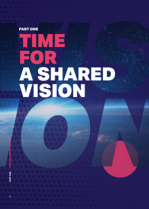The private sector is able to influence, empower and align actors up and down value chains, across geographies, cultures and socio-economic groups. While rightly recognizing the essential role that governments, civil society and the public at large will play in driving progress toward our vision, it is also clear that multinational corporations have a unique ability to lead the transformations that are required.
Understanding how important it is that people can truly live well, and do so within planetary boundaries, will drive forward-looking companies to ask themselves: what is their role in the kind of future we want to live and operate in; what are the pathways that will transition us to that future; and what can we do to accelerate that transition, while continuing to succeed today and be resilient into the future? Vision 2050 helps companies to answer these questions.
AN UNPRECEDENTED FORM AND LEVEL
OF BUSINESS LEADERSHIP IS REQUIRED.
The type of action that is needed to transform systems and achieve our vision will require an unprecedented form and level of business leadership. Companies need to build an ecosystem of action, creating unstoppable momentum towards Vision 2050. Realizing transformation will depend on leadership based on three core elements of our vision.
Embracing these three core elements of the vision will naturally lead to new levels of leadership. It will be aligned around a shared vision. It will be disruptive, rejecting business as usual but understanding the need to work within current systems as we seek to transform them to deliver fundamentally different outcomes. And it will be passionately committed to action, accountable for the progress that is necessary if 9+ billion people are to live well, within planetary boundaries, by 2050.
READ THIS NEXT
LATEST DOWNLOADS
Get all the key sections of our Vision 2050 report here to read how business can help build a better world.













